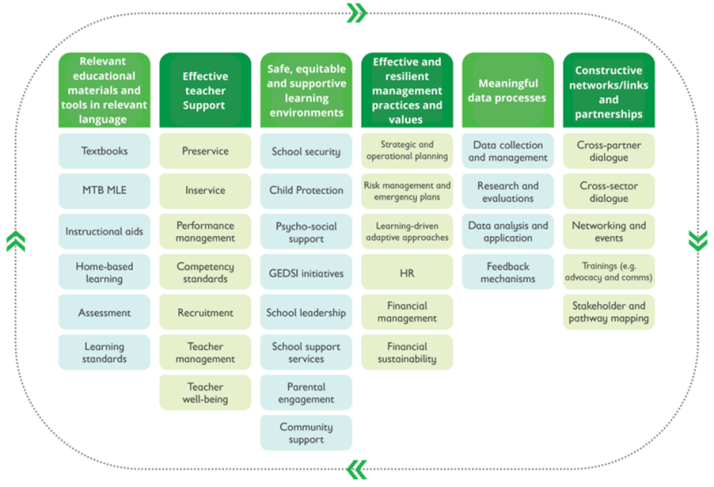How do we create change?
If MEC collaborates with selected complementary education providers to maintain and strengthen their education systems through a systems approach that includes a focus on:
- quality learning in line with students’ needs,
- resilience to continue delivering services regardless of challenging circumstances, and
- coordination with and support from a broad base of stakeholders,
Then these complementary education systems will be able to provide hard-to-reach children with the education they need, ultimately resulting in improved learning and well-being outcomes.
MEC’s Theory of Change


MEC is underpinned by a set of principles that guide decision-making on the implementation of our programme. These include:
Flexibility to respond to contextual variables and promote the nurturing of new opportunities, innovations and identification of solutions that meet program and partner requirements.
Evidence-based approaches to ensure best practice, emerging trends, and awareness of the fluctuating context are used to support design and decision making.
Trusted relationships to ensure support to partners is appropriate and demand driven, maintaining trust with partners through transparency and accountability.
Shared accountability to ensure that partners, children, and communities are engaged in influencing decision-making processes that affect them and provide them with meaningful opportunities for input, feedback and transparent communication.
Tailored approach to partners is applied to ensure that the inputs provided are relevant and respond to the unique operating context, constraints and priorities of each partner.
Systems approach to ensure sustainable systemic change by applying a systems approach that acknowledges the complexity of the education and broader operating systems within which ethnic and monastic schools work, recognizing their crucial role in the delivery of inclusive education yet financial and institutional vulnerability.
Examples of Our Support
Curriculum Development: MEC supports the improvement of MTB-MLE curricula as a key approach to enhance education outcomes. Delivering technical and financial support has facilitated the development of grade and subject curricula in Mon, improved curricula in Karen and enabled a baseline study in Kachin/N Shan that will inform development of a Kachin Basic Education Common Curriculum Framework.
Teacher Competencies: MEC supports pre- and in-service teacher training programs, Continuous Professional Development (CPD) frameworks for teachers to improve education quality and works with partners to develop and apply Teacher Competency Standards Frameworks (TCSF) in recruitment and performance management.
Teacher Stipends: MEC supports adequate payment for teachers as an action that recognizes the role of quality teaching in achieving strong learning outcomes. MEC programs demonstrate that teacher stipends contribute to stronger retention, mitigate against high attrition and enhance teaching quality, pre-conditions for systems strengthening. MEC continues to support teacher stipends whilst engaging in dialogue around longer-term sustainability for this critical area of need.
Please download MEC programme strategy brief here to learn more.
